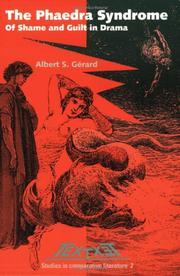| Listing 1 - 1 of 1 |
Sort by
|

ISBN: 9051834896 9789051834895 Year: 1993 Publisher: Amsterdam Atlanta GA Rodopi
Abstract | Keywords | Export | Availability | Bookmark
 Loading...
Loading...Choose an application
- Reference Manager
- EndNote
- RefWorks (Direct export to RefWorks)
Originating probably in some oral cautionary tale, the Phaedra story illustrates a peculiar pattern of transgression and retribution. This Phaedra syndrome provided inspiration for many major writers from Euripides to Gabriele d'Annunzio. The present book offers a close re-reading and a re-assessment of four acknowledged masterpieces - Euripides' Hippolutos, Seneca's Phaedra, Lope de Vega's Castigo sin venganza and Racine's Phèdre: together with Lope's Italian source. Matteo Bandello's Novella 44, they all deal with the old tale or none of its analogues. While paying minute comparative attention to the texts, it aims at clarifying the relevance of each work for the meandrous evolution of religious beliefs and ethical criteria in the history of European society, ranging from Democritus' effort to react against his contemporaries' archaic shame-culture attitudes to Latin Stoicism, to the syncretic Baroque outlook in siglo de oro drama and to the radical puritanical inwardness of French Jansenism. The last two chapters offer an original interpretation of Phèdre as the supreme poetic utterance of Racine's confusion and perplexity in front of the unresolved contradictions in his faith; a case is made in the Conclusion the view that the puzzled and puzzling mood of this mysterious play exemplifies the new mind-set that was paving the way for Enlightenment rationalism and the ensuing dechristianisation of the Western intelligentsia... Back Cover.
Comparative literature --- Thematology --- Phaedra (Greek mythology) in literature. --- European drama (Tragedy) --- Guilt in literature. --- Shame in literature. --- Phèdre (Mythologie grecque) dans la littérature --- Tragédie européenne --- Littérature comparée --- Culpabilité dans la littérature --- Honte dans la littérature --- Greek influences. --- Themes, motives --- Influence grecque --- Thèmes, motifs --- Phèdre (Mythologie grecque) dans la littérature --- Tragédie européenne --- Littérature comparée --- Culpabilité dans la littérature --- Honte dans la littérature --- Thèmes, motifs --- Phaedra --- Themes, motives.
| Listing 1 - 1 of 1 |
Sort by
|

 Search
Search Feedback
Feedback About UniCat
About UniCat  Help
Help News
News